- Career Advice
- Job Search & Interview
- Productivity
- Public Speaking and Presentation
- Social & Interpersonal Skills
- Professional Development
- Remote Work

Eggcellent Work
Work assignments during interview process: here’s how to handle this request.
When you prepare for a job interview, you likely will read up on the company , your interviewers and any other subject that will help. But you should also be prepared for your prospective employer to ask you to complete work assignments during interview process.
You may ask, what would I do if an employer asked me to produce free work as part of hiring process? Make sure you can answer that question because it could come up during your job interview. Employers are increasingly asking job candidates to complete work that demonstrates their skills and problem solving.
Some employers believe the assignments help weed out candidates who are not truly interested in the job. They believe if candidates accept the assignment, they will work hard to prove their worthiness as an employee. They also may believe if candidates question the assignment, they may not be as interested in the position.
Table of Contents
How work assignments during interview process help employers
Employers that use this tactic say it helps them see how candidates would approach the role that they are interviewing for, so it is helpful. The average corporate job opening receives more than 200 applicants, resulting in four to six candidate interviews. The interview assignment also helps candidates who may not interview well to shine by showing off their skills in the exercise.
An employer also may use the assignment to learn more about the candidate’s work process. Will they complete the assignment before deadline? Will they produce work that goes beyond the minimum needed to complete the assignment?
In some cases, it could be a brief, timed exercise that the employer gives to each candidate. These assignments are not likely to produce work the employer can use. It is more of a boilerplate problem for candidates to solve or a simple writing exercise to complete.
Read More: How To Ace Your Next Corporate Development Interview: Questions and Answers
How work assignments during interview process help job applicants
The interview assignment can help job applicants during the interview process. It is a great way to prove that you are the best candidate for the job. If you do a really good job on the assignment, the employer may be willing to offer more money for salary.
The assignment also gives you insight into the prospective employer’s expectations. It can be difficult at times with some jobs to understand exactly what the daily responsibilities and duties are. Such assignments can help shed light on that for you, and may help you decide whether to take the job.
If you complete the assignment and enjoyed the work, this could be a great sign. If you find the work tedious and not what you expected, it can help identify problems in the job.
What type of interview assignments can you expect?
Most companies are likely not looking for free work from candidates. But they must be sensitive to concerns that candidates will have that their time is not valued. The truth is, some companies receive free work from these arrangements and benefit from it.
There are examples of employers asking candidates to complete more involved exercises, then using the candidates’ work product. For example, a copywriter interviewing for a marketing job may draft content that the marketing team can later use without compensating the candidate. An applicant for a project manager job might develop a workflow plan and budget for a pending project that can be used.
Some employers are sending candidates home with work assignments during interview process that are quite involved. You should be aware that these requests are out there and develop a plan to respond to it.
It is reasonable for employers to ask candidates to demonstrate their skills, perhaps with an assignment that might take an hour. It is not reasonable to ask candidates to tackle assignments that take longer, maybe even days, without compensation. Here are some tips for handling requests to complete work assignments during interview process.
What is a reasonable and unreasonable assignment request?
First, it must be emphasized that employers asking candidates to complete simple, quick assignments is not unusual or unreasonable. In these cases, the person conducting the job interview can explain that this assignment is given to each candidate. It is a repeated task that is not used by the company to complete work without compensation.
It is important for candidates to know what the assignment is used for and how it fits into the interview process. This can be a useful tool to narrow down a finalist list for a position and to pressure test candidate claims about skills.
However, the problem occurs when a candidate receives an overly long and involved assignment request. If the candidate is given multiple days to complete the assignment, that is an indication that it may be too complicated. If a complicated assignment is given with unrealistic deadlines, that also is a red flag to consider.
But how can a candidate competing with others for a good job handle such involved assignments? The biggest fear is if you refuse, the employer will simply move on to candidates who will do the job. Here are several tips to consider when thinking about how to respond to interview assignment.
Suggest a simpler exercise
If you are presented with an assignment that appears complicated and involved, you could consider proposing an alternative. You can tell the employer that you have other work commitments that make it difficult now to complete the assignment. But tell them you are willing to complete an alternative that is less involved.
You can explain that your current job keeps you very busy and you have many commitments now. But offer to complete an exercise that takes about an hour or so to complete. This allows you to protect your valuable time, while also offering them insight into your process.
Offer samples of work similar to assignment
It is not unusual for you to explain that you have limited time outside of work. If you are asked to complete work assignments during interview process, tell the employer you do not typically do spec work. You can offer to share work you have done that is similar to the assignment.
If you have a portfolio of your work, tell them this will offer them the insight they seek into how you complete work assignments. You can even offer to arrange an interview with past supervisors who can discuss the quality of your work.
Find out more about the assignment
If the request you receive in the job interview to complete an assignment appears excessive, ask why it is requested. You can ask what they intend to do with the work you produce from the assignment. Ask them how many candidates will complete the task and are they all the same tasks.
If the assignment is particularly lengthy, you can ask if candidates have declined in the past to complete it. You can also ask if they have considered paying applicants as freelancers to complete the assignment. Also, ask how long to hear back after interview assignment if you elect to complete it.
Ask the Prospective Employer for Payment
Remember, the job interview is a vehicle for you to determine if the employer is right for you. It is a chance to speak candidly and professionally with your prospective employer. You can explain that you are willing to complete the assignment if they will compensate you for it.
As the rap singer Kanye West said, “Know your worth. People always act like they’re doing more for you than you’re doing for them.” You are showing the prospective employer that you know your worth by asking for compensation.
This idea only works when the assignment is particularly extensive and potentially can be used by the employer. Discuss options with the employer about payment, including whether a paid trial assignment will work. You could also offer to forgo payment if the employer decides to hire you.
How the company responds to your request will tell you a lot about it. If a company expects free work before they hire you, it likely will expect free work as part of your job.
How to decline an interview assignment and stay in the running
The best way to decline an interview assignment is to be honest. If you believe the assignment is too complicated and will take too long, tell them. If you are worried that the assignment poses a conflict in your other job, tell them.
Your job interviewer may offer some flexibility if you are honest with them. They may also determine that the assignment is not necessary if you are the top candidate contending. It is possible that the interviewer will also agree to an alternative assignment.
Employers asking candidates to complete assignments must recognize that applicants have limited time. It is not reasonable to expect them to complete a task that will eat up hours of their time. And if candidates produce excellent work, offer to pay them.
- What To Expect During Interview With HR After Interview With Hiring Manager
- Is HR Interview a Formality? – The Realistic Truth About HR Interviews
- 7 Tips To Impress an Interviewer in 30 Seconds
- Compelling Interview Presentation Topics to Showcase Your Skills
- Why “Looking For New Challenges” May Not Be a Good Answer When Interviewing for New Jobs
- How To Spots Companies That Interview With No Intention Of Hiring You
Jenny Palmer
Founder of Eggcellentwork.com. With over 20 years of experience in HR and various roles in corporate world, Jenny shares tips and advice to help professionals advance in their careers. Her blog is a go-to resource for anyone looking to improve their skills, land their dream job, or make a career change.
Further Reading...

First Job Interview Outfit – What to Wear and What to Avoid

What Is Purpose Of References In Job Application?

75+ Interview Presentation Topics to Showcase Your Skills
No comments, leave a reply cancel reply.
Save my name, email, and website in this browser for the next time I comment.
How To Become a Polymath in 4 Steps
My boss is bullying me to quit - here's how to deal with it .

- SUGGESTED TOPICS
- The Magazine
- Newsletters
- Managing Yourself
- Managing Teams
- Work-life Balance
- The Big Idea
- Data & Visuals
- Reading Lists
- Case Selections
- HBR Learning
- Topic Feeds
- Account Settings
- Email Preferences
10 Common Job Interview Questions and How to Answer Them
- Vicky Oliver

Use this guide to stand out from the crowd and land the role you want.
Interviews can be high stress, anxiety-driving situations, especially if it’s your first interview. A little practice and preparation always pays off. While we can’t know exactly what an employer will ask, here are 10 common interview questions along with advice on how to answer them. The questions include:
- Could you tell me something about yourself and describe your background in brief? : Interviewers like to hear stories about candidates. Make sure your story has a great beginning, a riveting middle, and an end that makes the interviewer root for you to win the job.
- How do you deal with pressure or stressful situations? : Share an instance when you remained calm despite the turmoil. If it’s a skill you’re developing, acknowledge it and include the steps you’re taking to respond better to pressure in the future.
- What are your salary expectations? : Before you walk in for your first interview, you should already know what the salary is for the position you’re applying to. Check out websites such as Glassdoor, Fishbowl, or Vault.com for salary information. You could also ask people in the field by reaching out to your community on LinkedIn.
Where your work meets your life. See more from Ascend here .
Resignation numbers have remained abnormally high in the U.S. between July 2021 and October 2021, with millions of Americans quitting their jobs — which also means there are millions of new openings up for grabs. If you’re entering the market for the first time, or just looking to make a change, use this guide to prepare for your next interview.
- Vicky Oliver is a leading career development expert and the multi-best-selling author of five books, including 301 Smart Answers to Tough Interview Questions , named in the top 10 list of “Best Books for HR Interview Prep.” She’s a sought-after speaker and seminar presenter and a popular media source, having made over 900 appearances in broadcast, print, and online outlets.
Partner Center

Executive Consultants of New York, Corp.
Workforce Development Is Economic Development®
- Dec 3, 2023
Navigating the Fine Line of Work Assignments During the Interview Process
Updated: Apr 16

In today's competitive job market, showcasing your skill sets is crucial in securing employment opportunities. Many job seekers find themselves not only demonstrating their skills in multiple interviews, showing previous work samples, requiring various skill tests but also by being asked by hiring managers to create new work or projects by prospective employers as part of the process. Potential job candidates grapple with the question of how much work is acceptable to demonstrate their capabilities before it becomes a form of unpaid labor. Striking the right balance is essential to protect your time and expertise while still making a positive impression during the interview process.
The Importance of Demonstrating Skills
Employers often seek tangible evidence of a candidate's abilities before making hiring decisions. Demonstrating your skills during an interview can set you apart from other candidates and provide employers with a clearer understanding of your capabilities. However, this process should be collaborative and respectful of both the candidate's time and the employer's expectations.
Understanding the Thin Line

While it's important to showcase your skills, it's equally crucial to recognize when a request for work samples or a demonstration project crosses into the territory of free labor. Here are some factors to consider:
Scope of the Assignment:
Acceptable: A small, task-oriented project directly related to the role can be reasonable.
Borderline: Extensive projects or assignments that mimic actual job responsibilities may raise concerns.
Unacceptable: Any assignment that requires a significant time investment and goes beyond the scope of the interview process.
Time Commitment:
Acceptable: A few hours or a brief task that can be completed within a reasonable time frame.
Borderline: Requests for days of work, especially if it's unpaid and resource-intensive.
Unacceptable: Any demand that significantly interferes with your current job, personal life, or involves an unreasonable time commitment
Transparent Communication:
Acceptable: Clear communication about the purpose, expected time commitment, and the use of the work.
Borderline: Lack of transparency about the purpose of the assignment or how the work will be utilized.
Unacceptable: Requests that lack clarity and transparency, leaving the candidate uncertain about the purpose or outcome.
Protecting Yourself
To avoid falling into the trap of providing free labor, consider these proactive steps:
1. Clarify Expectations: Before undertaking any task, ensure you have a clear understanding of the purpose, scope, and time commitment involved.
2. Set Boundaries: Establish limits on the time and effort you are willing to invest in pre-interview assignments, and communicate these boundaries to the employer.
3. Negotiate: If an assignment seems extensive, discuss with the employer whether there are alternative ways to demonstrate your skills or if a shorter version of the task would suffice.
4. Portfolio Presentation: Offer a portfolio of previous work, projects, or achievements to showcase your skills without the need for additional unpaid assignments.
In the dynamic realm of job interviews and skill displays, candidates must vigilantly protect their time and expertise, navigating the fine line between collaborative demonstrations and inadvertently entering the realm of unpaid labor. Unpaid assignments, driven by the intense pressure to secure employment, often lead to an emotional conflict between the desire for a job and the reluctance to engage in free labor. This internal struggle adds complexity to the job-seeking journey, prompting questions about ethics and equity in the hiring process. As employers increasingly demand bespoke projects, the need for industry-wide discussions on the ethicality of such practices becomes urgent. Advocating for transparency and fairness, it's crucial to collectively address the emotional toll of this delicate balance, fostering a hiring culture that values candidates without imposing unreasonable burdens. Initiating dialogues around these challenges and promoting fair practices can shape a job-seeking landscape that is both skill-centric and empathetic, respecting the individuals propelling it forward.
#interviewprojects #jobtest #companyworkduringinterview #interviewprojectideas #workingduringinterview #interviewchallenges #projectassessment #interviewworkdemands #worktasksininterviews #projectevaluation
Recent Posts
Job Seeking Realities - You’re Not Going Crazy…!
Ghosting and the Silent Treatment - Navigating the Lack of Feedback from Recruiters
Embracing Your Inner Badass and Overcoming Imposter Syndrome During Your Job Search
5 Types of Homework Assignments for a Skills-First Hiring Process
CVs and interviews don’t predict job performance, but work assignments can.
It’s really simple; hiring managers need to place competence in context to assess candidates’ technical and interpersonal skills .
If a structured interview process can help flush out candidates with the right attitude and cultural alignment, homework assignments can highlight people with the perfect skillset for the role.
And for a hiring manager, the hiring confidence when selecting between candidates who list the right skills on their resume and those who nail take-home tasks is like night and day.
Curious if work assignments could be a good fit for your company? In this article, we discuss:
- what a homework assignment is all about
- why companies prioritize work assignments over interviews
- how to reassure candidates that work assignments aren’t ‘free work’
- the easiest way to incorporate take-home tasks into your hiring process
- five tips for designing an effective homework assignment
Let’s dive in!
What is a homework assignment?
A homework assignment or an interview project is a task given to a candidate during the interview process that tests whether they have the right skills for a role. Typically these assignments take about an hour or two to complete and have a specific deadline. But they can be more detailed and take up to 5 hours or longer, depending on the role seniority or complexity.
We recommend sticking to a maximum of two hour-projects to keep it fair and reasonable for candidates. As a hiring manager, your main goal is to get a reliable snapshot of a candidate’s technical fit for the job – not to subject applicants to NASA-level testing.
Alternatively, you could swap homework assignments for paid test projects. While many candidates frown upon the idea of completing longer take-home tasks for free (who doesn’t hate free labor?), paid projects are generally accepted as a reasonable alternative. Learn how we leverage paid projects at Toggl Hire.
If a candidate won’t complete an assignment that takes less than 2 hours of their time, likely, they aren’t really interested in the role. So it also doubles as a reliable method to screen out prospective bad hires .
Why do companies ask candidates to complete homework assignments?
Homework assignments help companies get a better idea of a candidate’s strengths and whether they’d be a good match for the role. It’s a bit like shopping online. Seeing a new pair of sneakers you want in a 2D image is great. But getting a fully immersive AR experience really brings the sneakers to life and builds your confidence you’re making the right choice!
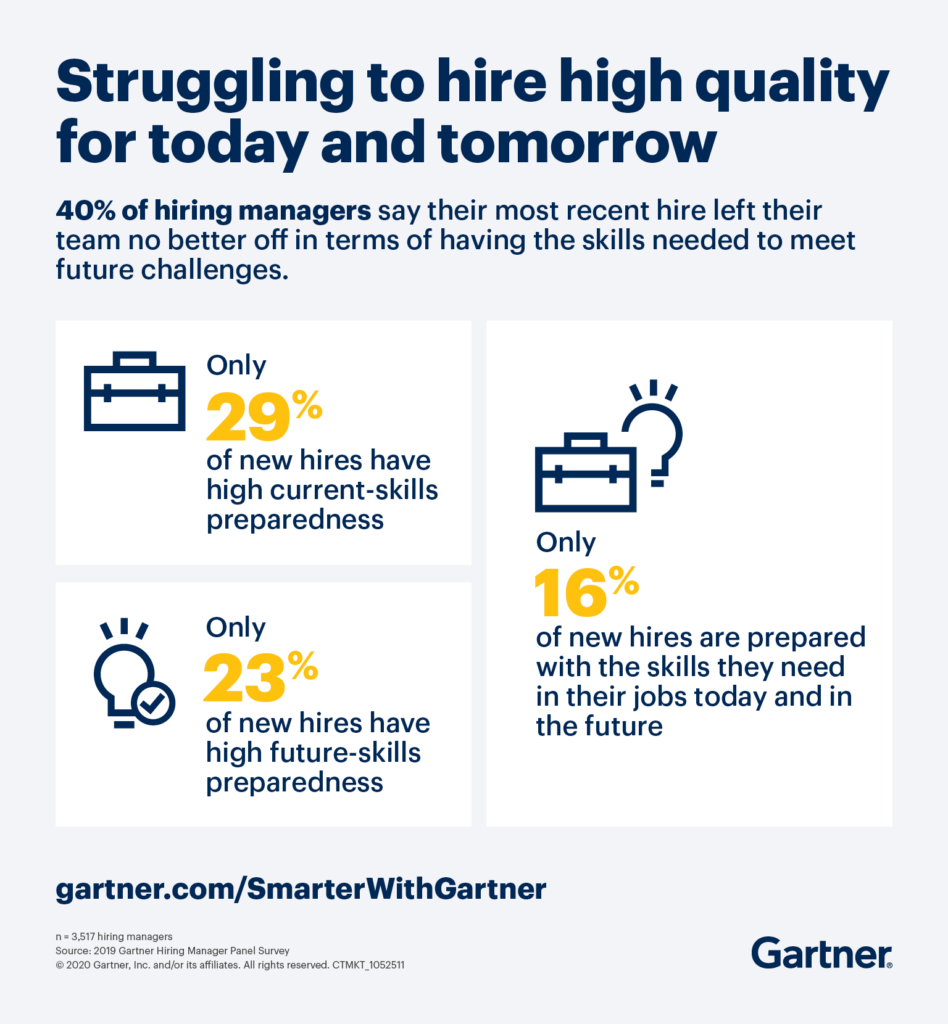
These days, many companies prioritize work assignments over interviews , as the typical interview process is outdated. Interviews and CVs alone don’t help the hiring team explore a candidate’s actual abilities. Why? Well, firstly, candidates sometimes exaggerate their qualifications on CVs. Plus, a potential candidate could be great in an interview scenario but terrible at the actual job.
Another reason interviews are passé is that they can open up the hiring team to potential cognitive bias (hiring someone very similar to you). This might seem kind of nice, but in the end, you’ll have less diversity if everyone you hired was a mini-me, right?
Yet, interviews do have an important role to play in the hiring process. But not right in the beginning, necessarily. Shifting the interview portion further down the hiring process steps helps companies focus on quality candidates rather than the search for quality candidates. They could rather confirm the technical fit through skills assessments and then dig deeper during the second interview.
According to HBR, prioritizing homework assignments over interviews can help recruiters better match true competency with the job requirements:
One of us (Jeff) spent several years hiring writers for our firm. He used a scenario-driven writing assignment, administered after a short introductory call, to assess skills. Many publications use writing or editing tests for job candidates, but Jeff approached the task more analytically than most: After receiving the assignment, he conducted a follow-up conversation to understand not just what was on the page, but the candidate’s choices in crafting it. Not only did this give us a sense of how a candidate would perform, but they got a much better sense of the job itself, as we related elements of the task to actual role expectations. By using the same exercise repeatedly, it also built a database of responses over time, a positive feedback loop to better assess the next candidate. Geoff Tuff, a principal at Deloitte Consulting LLP – Harvard Business Review
The real benefits are that work assignments and skills assessments paint a truer picture and can also:
- help identify the best person for the job
- reveal an applicant’s work ethic
- reduce the risk of selecting candidates that have lapsed technical skills (especially with the rapid evolution of technology)
- are easy to deploy at scale – you can narrow down the number of applicants from 500 to 50 to save the hiring team loads of time
- help organizations draw in non-typical but strong candidates that broaden the team’s diversity, equity & inclusion
- reduce the risk and cost of a bad hire

What do candidates gain from completing homework assignments?
Job seekers may not often feel enthusiastic about interview assignments. And we get it. People are busy juggling so many things in their day to day that adding one more can feel overwhelming. But those who look at the bigger picture see it as an opportunity to shine.
Work assignments are a foolproof way for job seekers to demonstrate their skills and expertise . And if candidates happen to have any gaps in their experience, they can still demonstrate their aptitude through an online assignment.
It’s also an easy way for candidates to show they’re truly interested in the position and the employer and stand out from the crowd of other applicants.
Not only do these task projects give them a peek into their potential day-to-day responsibilities , but it’s also a window into whether the role is a good fit for them in the long run .
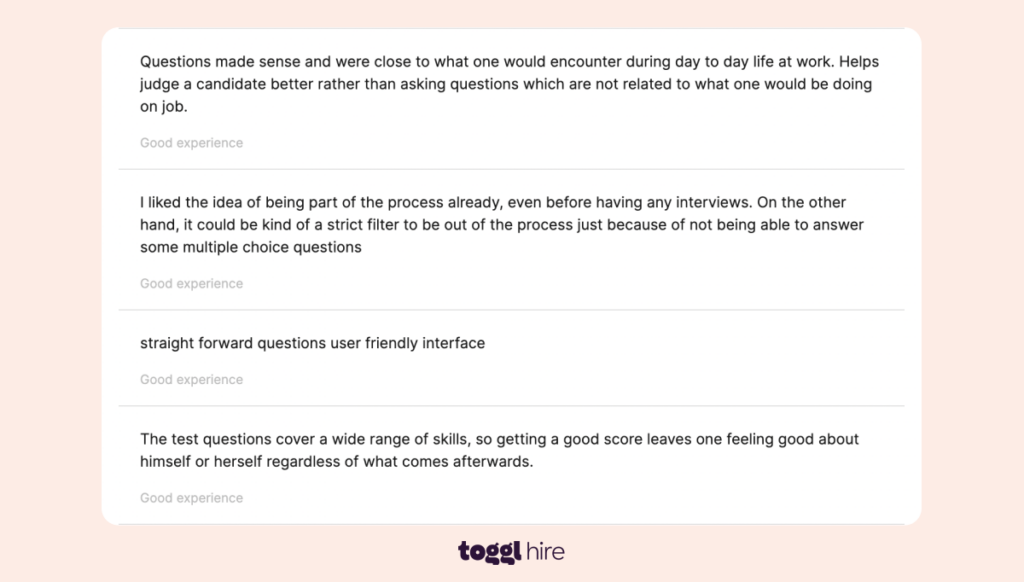
If they find the task takes too long or that the topic or sector is dryer than toast – they should put their sights elsewhere. But if it’s all systems go – then they’ve already got a head start on producing what’s needed for the role.
5 Types of take-home interview assignments
Take-home interview assignments are a popular choice for assessing technical and creative candidates. But now companies are seeing the benefits for other roles too.
Three things that hiring managers should consider for all these types of interview assignments:
- Letting candidates know about the test beforehand. That way, they’re not surprised and feel they’re starting off on the wrong foot.
- Automating everything they can in the testing process, so they don’t leave candidates high and dry in between lengthy hiring phases.
- Using the data they gain from these tests and candidate feedback to update their hiring process.
And now, onto the examples of homework assignments.
#1 Basic skills screening
Quick skills screening tests as a pre-qualifying step can help reduce the volume of applications without any manual effort. That means no manual resume screening or individual candidate feedback.
As applicants get instant feedback via skills test results (they either pass the required score threshold and move on or stop there), recruiters and hiring managers benefit in three major ways: 1) they save hours of their time by automating CV screening; 2) they can easily identify qualified applicants who should move to the interview stage; 3) they ensure a great candidate experience with modern skills-based hiring practices.
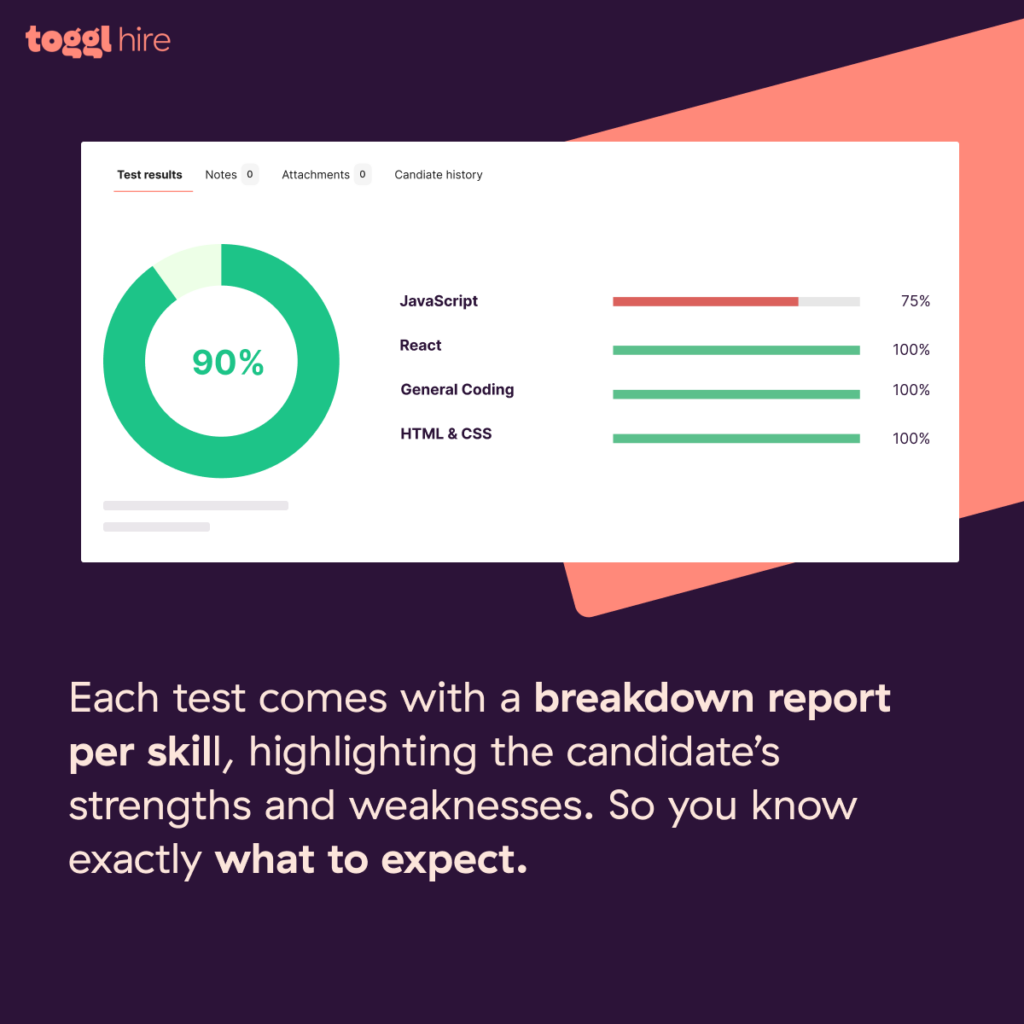
Good practices:
Keeping the tests short and sweet to respect candidates’ time and effort. We’d recommend 15 or 20-minute assessments at the kickoff. However, it’s important to ensure the tests are hard, so they actually act like a quality filter for your candidate pipeline.
Bad practices:
Focusing too much on theoretical, bookish questions that make the test feel like a school exam can harm your test completion rate and prevent great candidates from submitting their applications. Additionally, making the screening tests too long or too intrusive (e.g., taking snapshots through the computer camera) can create an unnecessary barrier and reduce your chances of sourcing top-quality people.
#2 Pre or post-interview coding challenges
While a job interview can help hiring managers assess interpersonal skills, such as communication , teamwork, or motivation, it’s not the best medium for evaluating hard skills . Online coding tests help the hiring team select technically capable developers that can contribute to the business.
A recruiter would typically source candidates with the right programming languages listed on their profile or resume. And then, it’s the hiring manager’s responsibility to work out if the applicant has what it takes to write good code. Easier said than done!
That’s why a coding assessment as a homework assignment has become the norm in tech hiring, and most developers are willing to take them on.
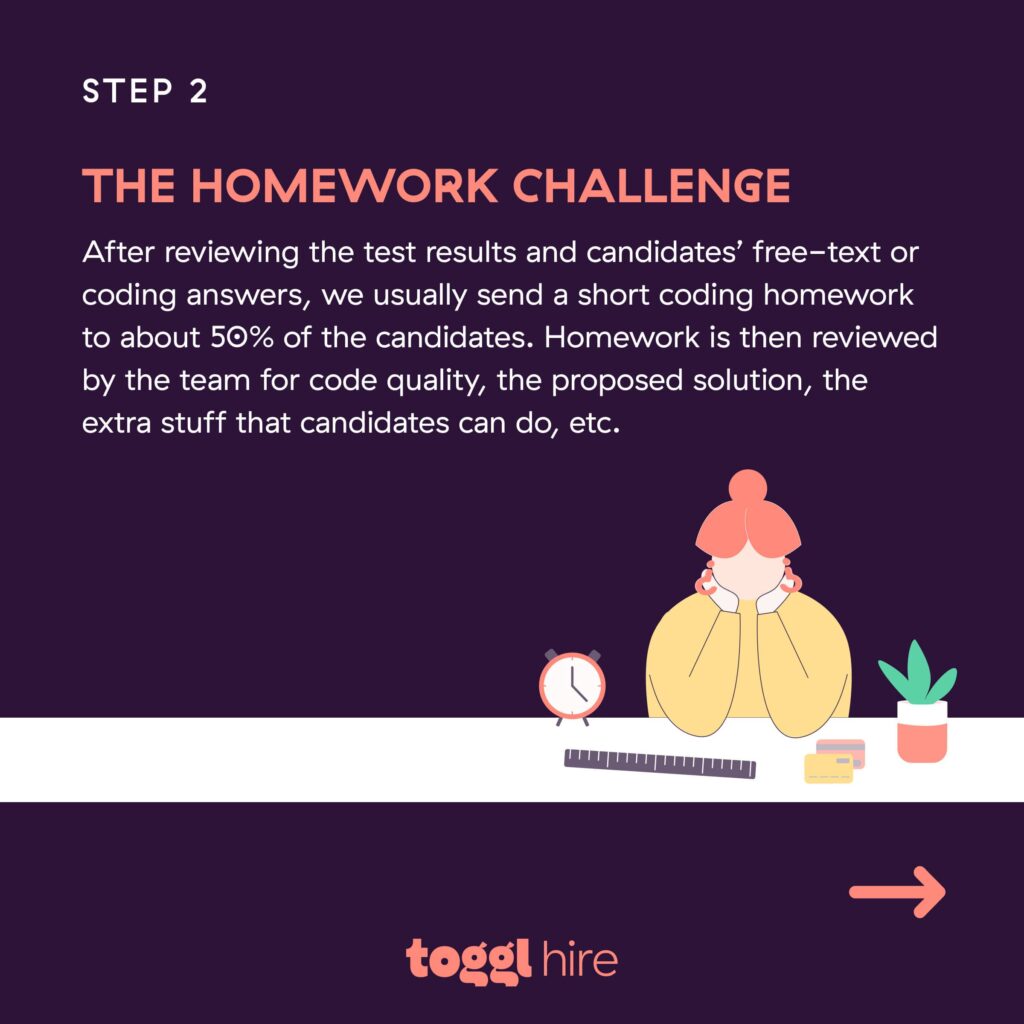
Remember, though; candidates don’t owe you free work. Your approach to designing a coding test will determine whether people continue in the hiring process or drop off.
First of all, decide what you want to assess and why. If you’re hoping to ascertain a candidate’s troubleshooting and problem-solving skills, time-boxing the assignment wouldn’t work to your advantage. The candidate can always use the ‘lack of time’ as an excuse for lower-quality work.
Another thing to remember is to set the test at the right skill level, depending on whether it’s a junior, intermediate or advanced role.
Testing skills that are nice to have or don’t match the role is a common mistake. Focusing on too many topics requires candidates to switch context from question to question – which is often confusing and tiring in such a short span of time.
Another issue employers run into is using clunky testing software that candidates need to figure out on the fly. If it takes effort to learn the platform or the platform doesn’t have the required features, developers will have to pay the price.

#3 Portfolio reviews and spec work during the job interview process
Ask any creative about their opinion on spec work, and you’ll likely hear that it sucks. And there are good reasons for graphic designers, writers, and other creatives to hate this kind of work – why should they commit to the project without any promise of payment?
If you’re hiring a professional from the creative field, we highly recommend starting with a live portfolio review . That’s when a candidate can take the interviewer through specific portfolio examples and share the backstory and lessons learned from that project. With creative roles, it’s often the unique style and quirks alongside the technical skills that can help determine the best person for the job.
However, sometimes paid spec work is a much fairer and more accurate way of getting insight into a candidate’s skillset. For tasks that require a highly personalized approach or solution, going the freelance gig route can yield better results.
Inform candidates ahead of time that you’d like to review their portfolio during a live interview. This will give them time to prepare and update their work samples. Ask questions that relate to their portfolio, even if the current samples don’t match your brief – you want to understand their creative process and practices. For paid spec work, make time to discuss the brief in person and agree on a check-in schedule to ensure work progresses in the right direction.
Springing this on the candidate without any warning and expecting the work to be delivered on a short deadline is a questionable move. Even if you’re opting for paid spec work, bear in mind these tasks are often completed in a vacuum and should be evaluated through a less critical lens. And finally, the not-so-secret secret: most creatives are terrible at maintaining their portfolios up-to-date. Giving them the heads-up will increase your chances of selecting the right talent.
#4 Time-boxed homework assignments that go in-depth to evaluate candidates’ competence
This type of home assignment can take many forms – from asking a marketing professional to write a press release for a product launch that already happened to requesting a business analyst to extract key insights from a dataset.
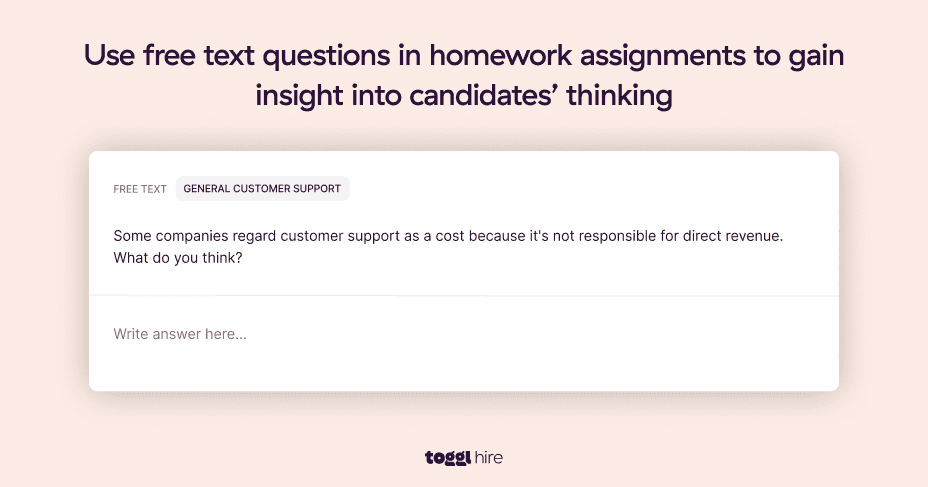
To ensure it’s not perceived as free work, time-boxed assessment projects often focus on real-world business problems that have been solved internally. This way, you can benchmark candidates’ work against your internal quality standard and reassure candidates of your intentions. The sole purpose of interview assignments is to confirm candidates’ technical fit in an efficient manner.
Keep the topic or assignment relevant to the role, and limit the necessary time it’ll take to complete to about 2-3 hours. Remember that the clarity of your brief will largely determine the quality of the deliverables, so be specific about your expectations.
Expecting someone to take 5-10 hours out of their busy schedule for an unpaid assignment is unrealistic.
#5 Paid projects during the interview process
Interviewing is exhausting for both the candidate and the interviewer. So it’s unsurprising that paid interview assignments have been gaining in popularity in recent years.
As a hiring manager, would you rather spend hours of your time interviewing candidates to filter out the bad apples or use the job interview as a way to get to know potential hires?
Homework assignments are exactly that – a simple, efficient method for spotting A-level candidates with the right skills for the job.
As you confirm the technical fit before the interview, both parties can focus on aligning on other important factors, such as the organizational fit , team culture, and manager expectations.
However, many employers have realized that the sentiment around homework assignments has shifted from acceptable to immoral, as applicants began calling assignments ‘free work’. Research shows that drop-off rates increased when candidates were asked to complete a take-home assignment.
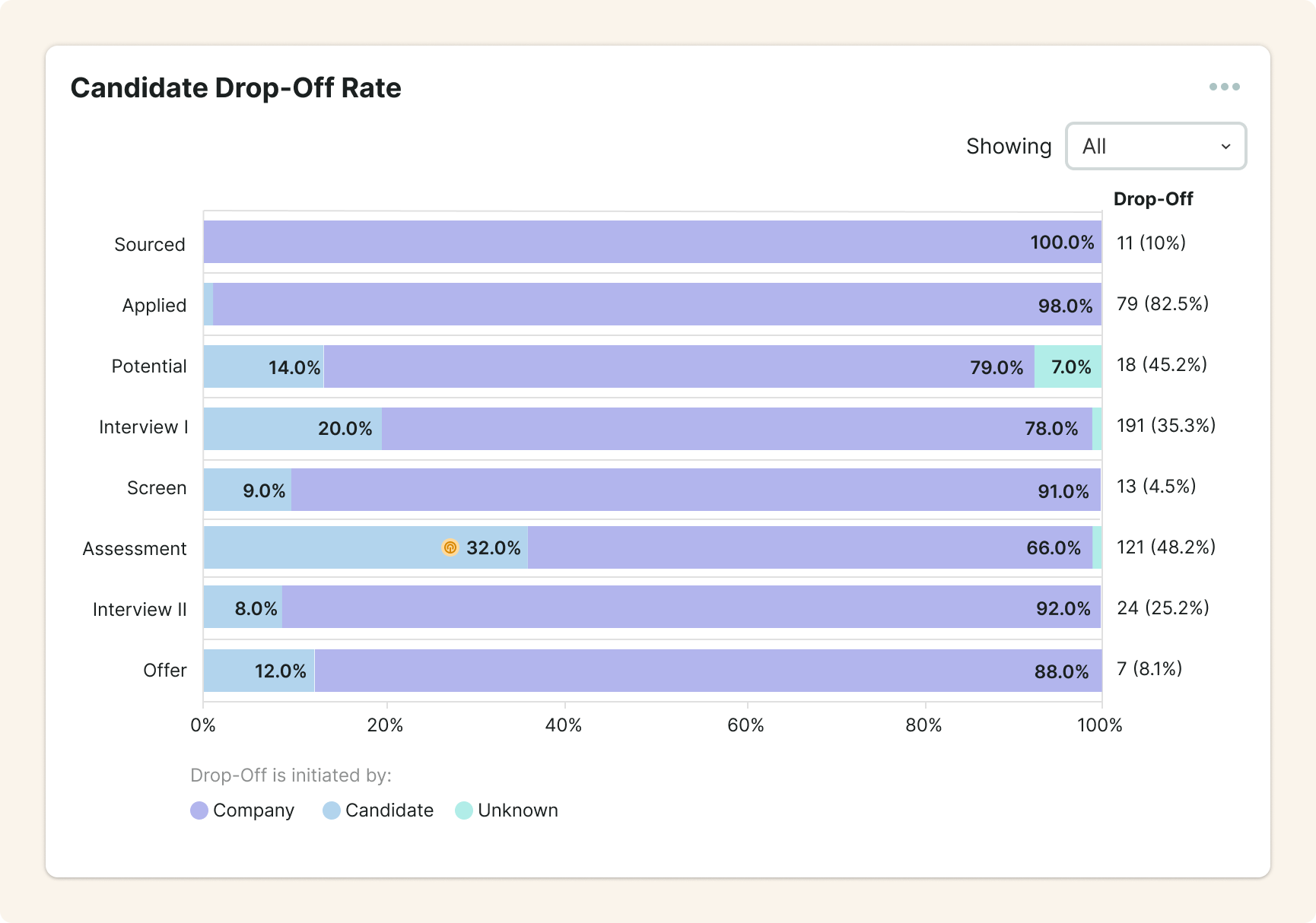
Enter paid homework projects.
The perfect combo of practical competency assessment and paid work. Since the candidate receives compensation for their time, these types of assignments can be longer and more complex.
Anything from analyzing the growth funnel to tackling a programming challenge to designing an effective product onboarding experience can serve as a homework assignment idea.
What’s important to note is that these kinds of work assignments allow employers to get a glimpse into a candidate’s work ethic , thinking process, time management, and many other skills that are impossible to assess during the interview process.
If you’re paying for their time, treat them like consultants: provide access to important information, answer their questions and connect them with the right people internally. And be sure to outline the recruitment process at the very start; not everyone will happily take on a bigger commitment project, even when it’s paid.
As a hiring manager, stay in touch throughout the recruitment process to lay the foundations for a good working relationship. Provide clear requirements and timelines to reduce stress, and don’t forget about fair compensation – going below the market rate is disrespectful.
A great way to cause unnecessary stress is to ask candidates to present to a large audience or high-level execs they would never work with on a day-to-day basis.
Be sure to provide a clear agenda for the presentation call ahead of time and prep your interview panel for follow-up questions.

The work assignments and interview process windup
Work assignments are a good thing for companies and candidates alike. The result is like the difference between speed dating and a real dinner and a first date. Yes, they’re both exciting, but in the case of hiring, you need to hire someone that can demonstrate they have the right skills. The cost of hiring the wrong candidate is just too high for companies.
To find truly interested candidates, who have the right aptitude, introduce your team to the benefits of work assignments. You’ll save both parties loads of time and the hassle of a dragged-out interview process and other redundant hiring steps.
If you’re ready to explore how to transform your business’ hiring process from a time-consuming to a slick candidate pipeline, we leave you with five simple tips on designing an effective homework assignment.
5 simple tips for designing a great homework assignment:
- Replace resume screening with basic skills screening. Start the sifting process early with a quick skills screening test . This will weed out the bad eggs and leave you with a selection of good potential candidates.
- Make your assignment brief and easy to understand, and explain the key outputs you expect.
- Match the level of the homework assignment to the level of the role. Unrealistic tasks will only scare people off.
- Don’t request candidates to solve super-specific business problems. Make the assignment generalized, not based on a super specific problem your business is experiencing.
- Give the candidate a chance to show and tell. That way, you get insight into their thought process, presentation skills, and even emotional intelligence when their viewpoint is challenged.
Have a peek at our Test Library for more assignment ideas, and good luck!
Juste loves investigating through writing. A copywriter by trade, she spent the last ten years in startups, telling stories and building marketing teams. She works at Toggl Hire and writes about how businesses can recruit really great people.
Join 30,000+ subscribers getting the best tips on productivity, work management, hiring and more!
We promise we won't spam you and you can unsubscribe anytime.
You might also like...
Related to Talent Acquisition

The Top 16 Candidate Assessment Tools in 2024
Take a peek at our most popular categories:
- Career Development
- Changing Careers
- Choosing a Career
- Unemployment
- Work Abroad
- Work from Home
- Cover Letters
- CVs & Resumes
- Finding A Job
- Interview Preparation
- Social Media
- Human Resources
- Social Recruiting
- Employee Recognition
- Handling Conflicts
- Health & Wellness
- Productivity
- Work Culture
- Work Life Balance
- Books and Videos
- Celebrities
- Entrepreneurship
- Quotes & Tips
- Success Stories
- College & University
- Courses & Training
- Internships
- Skills Development
- Student Life
- Book a Demo

AI and Automation Powered Recruitment Trends – 2022 Webinar
The biggest challenge of managing remote recruiters, the best chrome extensions for recruiters are, coronavirus and working from home policy best practices, how to write an elite executive resume 10 simple tips, top 30 recruitment mistakes: how to overcome them, what is an interview: definition, objectives, types & guidelines, 20 effective or successful job search strategies & techniques, “text messages – your new recruitment superhero” recorded webinar, find the top 10 it contract jobs employers are hiring in…, the real secret behind the best way to contact a candidate, candidate sourcing: what top recruiters are saying, what is omnichannel recruitment marketing, talent intelligence – what is it how to implement it, remote recruitment: everything you need to know, 4 old school business processes to leave behind in 2022, how to prevent coronavirus by disinfecting your home, the black lives matter movement and the workplace, yoga at workplace: simple yoga stretches to do at your desk, top 63 motivational and inspirational quotes by walt disney, 81 inspirational and motivational quotes by nelson mandela, 65 motivational and inspirational quotes by martin scorsese, most powerful empowering and inspiring quotes by beyonce, what is a credit score how to improve your credit score, who are the highest paid athletes in the world, top careers or jobs that pay $50 an hour, what are the highest paying jobs in new zealand.

Work Assignments During the Interview Process: What to do?
A recent trend in the hiring process these days that are catching up is giving an assignment to the candidates before finalizing them for the job. With so many job seekers in a market with lesser and lesser opportunities, it is becoming difficult for the recruiters to find the right candidate for the job.

The whole process of hiring and firing is a loss for the company . Hence an assignment is given to finalise the right candidate. This process has its own pros and cons which can be a time consuming effort to the person.
Listed are the 15 things that every job seeker should know about the work assignments when employer asks you to submit some assignments during interview process.
Work Assignments During the Interview Process – What Every Job Seeker Should Know:
1. explains about you:.
Work assignment is a way for the employer to know about you. As it becomes a professional interactive session, hence they get to know your working side. Whether you have doubts and queries or are you asking the right question.
Also how much knowledge do you have about that specific area. It makes an easy task for the employer to take a decision whether to hire you or not.
2. Practical test of the resume:
It a common practice among people to mention fake skill sets and during interview they are able to convince the employer. When hired, the person is not able to perform as said in the resume, hence the assignment becomes important to test the truth listed in the resume. The genuineness of the resume becomes essential in this process.
3. Prevent from being biased:
Sometimes during an interview the chances of biasing towards a favourite candidate tends to pick up. For example, the manager could be from the same college of the person, or able to develop certain liking towards the candidate during the interview process.
Favoritism tends to happen a lot in interview processes which reduces the chances of missing out on the right candidate, hence a loss to the organization.
4. To decide the final candidate:
Sometimes a situation arises where choosing between final two or three candidates becomes a tough choice. With similar qualifications, skill sets the final call becomes difficult to take.
The assignment test works as a tie breaker and makes the decision making quite easy. The candidate who fits the final bill of the company gets the opportunity.
5. Capability to understand the brief:
Whether the person has completely understood the brief to deliver is a way to figure it out from the assignment. It is a crucial process in the work before delivering the results, most of the employees tend to miss out on the exact brief given, hence the output is not in the right direction. The assignment is the best way to judge the analytical capability of the person.
6. Enthusiasm:
Another important part is the organization comes to know about your enthusiasm level towards the work. Organizations appreciate candidates who enjoy the work and are enthusiastic about it, rather than who might not be really interested in the work.
Sometimes candidates might not be able to deliver the results, but due to their sheer enthusiasm and passion towards the goal leads them to be preferred for hiring.
7. Gives the idea about the company:
The work assignments are also beneficial to the candidate along with the organisation. It helps the candidate to know the kind of work he or she might be getting into the future and analyze the situation before getting into the job.
It is convenient to know if you would really like to work with this firm or you would like to look somewhere else.
8. Capability of strategic planning:
It gives an understanding and information of your strategic planning capacity. How you would be delivering the results in a stipulated time period, a challenge essential for any organization. The work assignment explains a lot about your work flow structure along with the capability to present it in the right flow.
9. Knowing your talent:
Every organization prefers candidates with the right set of talent. These assignments also explain a lot about your strength and weaknesses which even you might not be aware of.
It helps the organization know your true skill and might hire you in a different profile altogether other than you would have applied for. Hence keeping the options open is never a bad idea.

10. Asking questions:
Employers like their employees to ask the right questions and to find the best possible answer for it. Therefore, it is important after the assignment is given to you, do go through the brief and ponder over it for some time. Then ask for the required additional info or clear your doubts then and there.
This gives an approach of your thinking capacity to the employer and let them know that you have already taken charge of the situation.
11. Discuss for non disclosure documents:
Many incidents have happened that employers give these assignments before hiring and once the candidate is done they might not even hire you. Later on you might come across that they would be using your idea already.
To prevent from putting your effort without any results it is advisable to discuss non disclosure documents.
12. Decide the time and effort required:
Before committing and doing the assignment understand the time limitations and efforts required to be given in the assignment. It is of no use if you put in too much effort into it and later if you are not selected for the position.
It will be a wasted effort for you, therefore, keep your efforts limited and work smartly. Also ensure not to spend too much time on it.
13. Keep the practical approach:
Understand the exact requirement of the brief. Do not go overboard. Sometimes employers give a task which might not be achieved in the deadline given or the assignment might be not your specialization.
So it is good to be practical and discuss your limitations before rather than getting stuck with it without any results.
14. Do not emotionally attach with the work:
Everyone loves their work in which they have put their heart and soul. It is a human tendency to fall in love with the work you do, in your eyes it might be the best work of your life or you would think that it will impress the employer in an instant.
Know it is just a process to get a job and whatever the result maybe its good to finish the work and keep aside.
15. Avoid getting into details:
Another essential point to note is that to keep your ideas simple and do not delve in the extreme details. In case you are not hired then the chances of getting your ideas will be reduced. It is good to mention the overview of what you intend to achieve and avoid using exact values and figures of it.
Conclusion:
Work assignments are effective trends in hiring process , which might take over a major role what interviews were and are. It does provide a clarity at both ends, whether you are an apt candidate to the organization or that job role is what you are looking ahead to pursue.
It is better than getting into the job role you might not like and stress yourself out later on. The benefits of it vary from every individual and organizations. Yet one cannot ignore this trend so be prepared if in case the next organization you apply ask to submit an assignment.
RELATED ARTICLES MORE FROM AUTHOR
Best hypothetical interview questions and answers, how to give self introduction in interview easily, how to become a fashion consultant: a complete guide, top 20 java interview questions – how to answer them, what to do after an interview how to follow up tips, problem solving questions: what are they – how to answer, case interview: how to ace it (sample questions & answers), how to answer “what are your strengths and weaknesses”, editor picks, popular posts, 150 best inspirational or motivational good morning messages, what can you bring to the company how to answer, why research is important for students, humans, education, popular category.
- Career Advice 1269
- Career Development 742
- Job Search 675
- WorkPlace 553
- Management 523
- Interview Preparation 452
- Work Culture 330
- Human Resources 266
You’ve made it past the interview phase and you’re feeling good about your chances of landing the role! Before you can make it any further in the process, however, the hiring manager wants you to complete an interview assignment. This may come as a big surprise, and you may be wondering why taking this extra step is even necessary.
Job interviews help the employer get to know you and assess whether you would be a good fit, but an interview assignment can give them a more tangible idea of your skills, how you think, and your work ethic. They can vary from a writing assignment, a technical assessment, or a presentation, and typically come toward the end of the hiring process when the employer is closer to making a decision.
Whether you decide to move forward on an interview assignment is entirely up to you and how good you feel about the employer and their hiring process. If this is something you are considering, here are five ways to handle interview assignments.
Understand expectations
Make sure you clearly understand the employer’s expectations for the interview assignment. Before you get started, you should be able to answer these questions:
- What is the deadline to complete the interview assignment?
- How much time should you spend working on the assignment?
- What exactly should you be including in the final piece? A high-level overview or specific details or ideas?
- How will this be evaluated?
Ensure you have enough time to complete the task
Make sure you are able to complete the assignment (and do a good job) within the deadline you are given. At the same time, it’s important to consider how much time the assignment will actually take. If it’s simply too much work or you have been given an unreasonable deadline, you’re within your rights to reconsider. If the employer is not being respectful of your time, you may want to ask yourself if the opportunity would ultimately be the right one for you.
Ask for more information
If you feel like your interview assignment would be improved with more context about the company or specific departmental processes and goals, don’t be afraid to ask for more information or data. This can help demonstrate your interest in the role, as well as help you work on a more custom project, proposal, or presentation. If this additional information is not available, don’t stress about it! Do your best to work with the information you were given or have found through your research. The hiring manager will understand.
Don’t go overboard
While interview assignments can be a great way to prove yourself, avoid going overboard. If you feel like you are starting to go above and beyond, it’s important to take a pause. Remember, you are not an employee just yet. It is not your job to do actual work for the company. While you want to demonstrate that you are a strategic thinker and that you have good ideas that can be valuable to the organization, you need to walk a fine line. It should raise some red flags if the employer has unrealistic expectations about what you can and should accomplish.
Review your work
Make sure you take the time to review your work before you submit, and if applicable, practice your presentation or proposal. During this stage in the process, it may also be helpful to enlist the help of a friend. They may be able to catch any issues in the written assignment, and give you tips for perfecting your body language and presentation skills—helping you boost your confidence for the big day.
Get our latest job search and career insights delivered straight to your inbox

How To Prepare For An Interview: The Ultimate Guide

How To Job Search During Tough Times

Should You Use ChatGPT to Write Your Resume? 8 Dos + Don’ts
Why Take-Home Assignments are the Biggest Mistake for Hiring Managers

There’s no “right” way to hire.
Some companies are comfortable having a 30-minute conversation and pulling the trigger, while others might want a couple of steps and additional interviewers involved in the process to ensure they’re getting multiple opinions on who to hire.
And while some employers make it a point to stay on top of the latest industry trends like the ones found in our 2023 Salary Guide , others fall short and — time and time again — make the same mistakes.
Why the take-home assignment interview is a big mistake
Different interview processes work for different companies. But there is one interview mistake I’ve seen across various industries — for both contract and full-time hires — that creates a major bottleneck in the interview process, and that is the take-home assignment .
Take-home assignments can be called something different depending on what the role is.
- For a marketing position, it might be a case study .
- For a software development position, it might be a coding test .
- For a client-facing role, it might be a presentation .
Regardless of the name, the outcome is often the same: candidates you were excited about drop out of the interview process, and you find yourself back at square one again and again.
From my experience in staffing, I strongly advise my clients against incorporating a take-home assignment into their interview process.
Why You Shouldn’t Assign a Take-Home Assignment
No one likes to do take-home assignments for free..
When asking candidates to do an assignment during the interview process, it’s often the work that they will be doing once they get hired, so it’s essentially asking them to work for free.
For candidates, time is money, and it’s time that can be spent working for their clients who are paying them.
This interview mistake doesn’t respect people’s personal time.
Imagine you’re working 9-5 and looking for a new job. You also have two kids who need to be picked up from school, fed, bathed, and put to bed every night.
You are so overloaded in your job that you sometimes have to work after hours. When would you have the time to also fit in doing an assignment that can take anywhere from 2-10 hours?
Candidates often cannot prioritize doing additional work because it will take time away from something else they need to get done. The longer it will take a candidate to find the time to complete the take-home assignment, the more likely their interest in the job opportunity will wane.
Other companies aren’t making this interview mistake.
As much as you want to vet candidates for the right skill level, it’s important to be competitive with how other companies are hiring, so you don’t lose out on top talent.
Creatives often get hired based on their portfolios—without an interview. Developers get hired off of a single Zoom interview.
Higher-level roles get hired after multiple rounds of interviews, which function as conversations with various stakeholders at a company, without being asked to do homework for an interview other than preparing.
If you ask a candidate to do an assignment before engaging them in the next step of an interview process, they might say they are happy to do it, but the truth is they will usually wait to start it until completing any other interviews they have lined up in hopes of getting a decision from another employer sooner.
This interview mistake fails to filter out people who aren’t serious about the role.
Many companies think these assignments will show how much a candidate wants to work at their company.
I strongly caution against this logic. The post-COVID job market is more competitive than ever, as companies with once-traditional mindsets around employees working onsite have adapted to now offer fully remote roles.
This means that candidates now have access to nationwide job opportunities and are getting job offers faster than ever before.
If seeing how serious someone is about a role at your specific company is important to you, gauging how much they researched the company before the interview is a great way to find that out.
Hiring Managers Should Avoid the Take-Home Assignment
Making the common interview mistake of requiring a take-home assignment most often results in the assignment not getting completed and the candidate pursuing a different employment opportunity that doesn’t require an additional assignment.
It’s understandable that a hiring manager would want to test a person’s skill before offering them a job. The good news is that there are ways to do this that don’t involve asking a candidate to do extra work.
Ways to Avoid Making this Interview Mistake
Ask to see sample work from potential candidates..
Copywriters and designers have portfolios, developers have GitHubs, and high-level individuals can often pull sample proposals and plans they’ve put together in the past to exhibit their work.
If you have questions about how much they did themselves, what went into the decisions they made, or other related questions, the interview is the perfect place to dive in and find out.
Ask your job candidate to do a test in real-time on the interview.
Some hiring managers prefer not to do this because candidates might feel “put on the spot” and not perform their best.
However, I can’t think of a single employer I have worked with who didn’t care equally about the candidate getting to the right answer, as they did about how they got to the right answer and what that showed about their thought process.
Doing a test or exercise together, and being able to speak with the candidate during it, is a great way to understand their logic.
Ask your job candidate scenario-based questions.
If you have a concern about how a candidate would handle a situation—whether it’s technical, about communication, or how they work with a team—ask specific, pointed questions to find out your answers.
Requesting references is a great way to avoid this interview mistake.
It is completely acceptable to extend an offer pending reference checks so you’re able to get background information from someone who worked with this person before and can vouch for the candidate’s expertise.
Find great talent when you partner with Mondo
Looking to hire? Contact us to get started:
The Final Word On Take-Home Assignments for Hiring Managers
Hiring is a gamble. It’s normal to have a degree of trepidation about extending an offer to someone without a guarantee that they’ll be able to perform at the level you expect. But the best way to see if someone can do the job is to trust your gut and give them the chance to prove you right.
Mondo Matches Great Talent With Great Companies
With an expansive, connected network of the top IT, Tech, Creative, and Digital Marketing professionals and a proprietary process, Mondo can match you with the hard-to-find, specialized talent you need.
- Contact Mondo today for all your hiring needs
- Download our 2023 Salary Guide for detailed salary breakdowns for roles & jobs across the technology, creative & digital marketing industries
2024 Salary Guide: Tech, Creative & Digital Marketing
By Sarah Magazzo
Digital Marketing Manager for Mondo National Staffing Agency
Related Posts

Consultant Corner: Inside Videography Trends with an In-Demand Video Editor

10 Companies That Hire For Skills Over Education

Highest-Paid Software Engineer & Developer Jobs by Salary
Never miss an insight, subscribe to our blog, staffing that works">a unique approach to staffing that works.
Redefining the way clients find talent and candidates find work.
We are technologists with the nuanced expertise to do tech, digital marketing, & creative staffing differently. We ignite our passion through our focus on our people and process. Which is the foundation of our collaborative approach that drives meaningful impact in the shortest amount of time.
Staffing tomorrow’s talent today.
- Skip to main content
- Keyboard shortcuts for audio player
Morning Edition
- Latest Show
- About The Program
- Contact The Program
- Corrections
Listen to the featured story from this episode.

Speaker of the House Mike Johnson visited Columbia University on April 24 to meet with Jewish students and make remarks about concerns that the ongoing demonstrations have become antisemitic. Alex Kent/Getty Images hide caption
House passes bill aimed to combat antisemitism amid college unrest
House Speaker Mike Johnson met with a group of Jewish students at Columbia University who say they've experienced antisemitic speech and harassment from protesters on and off campus.
Morning news brief
by Michel Martin , Steve Inskeep
'Unfrosted': Jerry Seinfeld's movie about the fictional history of Pop-Tarts
Federal health officials aim to develop a vaccine to protect people from bird flu.
by Michel Martin , Rob Stein
Indiana has its first competitive primary race for governor in 2 decades
by Brandon Smith
Have you ever wanted to stay in a floating house? Airbnb has the place for you
High tariffs are keeping affordable chinese-made evs out of the u.s. for now.
by Steve Inskeep , Camila Domonoske
Governor declares state of emergency for West Virginia's higher education system
by Chris Schulz
People with bold appetites might want to try eating cicadas
Examining the police response to the pro-palestinian college protests.
by Steve Inskeep , Martin Kaste

Campus protests over the Gaza war
by Barbara Sprunt
On a day off from his hush money trial, Trump campaigns in 2 swing states
by Steve Inskeep , Danielle Kurtzleben
Pregnant women in some states aren't permitted to legally finalize divorces
by Katia Riddle
Middle East
Jordan demands that israel provide better security for aid convoys.
by Michel Martin , Jane Arraf
NPR election poll shows fundamental divides over concerns for America's future
by Steve Inskeep , Domenico Montanaro
Rock and Roll guitar legend Duane Eddy has died at age 86
As 'euphoria' takes the hip-hop world by storm, what makes a good diss track, arizona legislature votes to repeal the state's civil war-era ban on abortion.
by Steve Inskeep , Ben Giles
Examining the obstacles to securing a cease-fire in Gaza and hostage exchange
United methodist church votes to lift bans on lgbtq clergy and same-sex weddings.
by Jason DeRose

Students and pro-Palestinian activists face police as they gather outside of Columbia University to protest the university's stance on Israel's war in Gaza. Spencer Platt/Getty Images hide caption
NYC mayor says 'outside agitators' are co-opting Columbia protests—students disagree
by Destinee Adams
Searching for a song you heard between stories? We've retired music buttons on these pages. Learn more here.

IMAGES
VIDEO
COMMENTS
Work assignments are most common in creative and technical fields of work. For example, writers may need to complete a trial piece before being hired, and marketing professionals may have to create a campaign pitch and outline as part of their interview process. For more technical work, like information technology or computer science, the ...
3. Outline Main Points, Only Tease the Details. More often than not, the primary reason companies dole out homework is to get a better sense of your thought process, as well as how you structure and convey your thoughts and ideas. There's not necessarily a "right" answer, nor is there a need to get way down in the weeds.
Your potential bosses don't want to hire someone who will do only half the job or a different job entirely. This is how you can show them they can count on you to get it done. 2. You Didn't ...
Of course, questions aren't the only way to evaluate candidates during the interview process. LinkedIn found that work assignments are one of the most effective yet underused interviewing ...
3. Outline Main Points, Only Tease the Details. More often than not, the primary reason companies dole out homework is to get a better sense of your thought process, as well as how you structure ...
Practice Your Skills. If you're preparing for a job interview assignment, chances are it will test a specific skill, like coding in Java, analyzing data in Microsoft Excel or writing about technical subjects. Even if you don't know yet the exact type of question you'll be asked, practicing the skill you'll need to know before you get ...
Embrace work assignments to make your interview process more effective. Work assignments are an often-overlooked and incredibly effective method of assessing a candidate's skills that you can ...
The interview assignment can help job applicants during the interview process. It is a great way to prove that you are the best candidate for the job. If you do a really good job on the assignment, the employer may be willing to offer more money for salary. The assignment also gives you insight into the prospective employer's expectations.
Vicky Oliver is a leading career development expert and the multi-best-selling author of five books, including 301 Smart Answers to Tough Interview Questions, named in the top 10 list of "Best ...
1. Clarify Expectations: Before undertaking any task, ensure you have a clear understanding of the purpose, scope, and time commitment involved. 2. Set Boundaries: Establish limits on the time and effort you are willing to invest in pre-interview assignments, and communicate these boundaries to the employer. 3.
A homework assignment or an interview project is a task given to a candidate during the interview process that tests whether they have the right skills for a role. Typically these assignments take about an hour or two to complete and have a specific deadline. ... The work assignments and interview process windup. Work assignments are a good ...
Outline your company's most desirable traits as an employer. Talk about any future plans and how they will benefit the new hire. Use what each candidate indicates is important to them in a new job to personalize your pitch. Talk about next steps. Let candidates know when you will follow-up after the interview.
This process has its own pros and cons which can be a time consuming effort to the person. Listed are the 15 things that every job seeker should know about the work assignments when employer asks you to submit some assignments during interview process. Work Assignments During the Interview Process - What Every Job Seeker Should Know: 1.
Review your work. Make sure you take the time to review your work before you submit, and if applicable, practice your presentation or proposal. During this stage in the process, it may also be helpful to enlist the help of a friend. They may be able to catch any issues in the written assignment, and give you tips for perfecting your body ...
Learn first-hand whether a candidate is a good fit for the team by incorporating role-based assignments at strategic times during the interview process. Let's explore a tale of two hires. In a recent interview cycle, two candidates aced their face-to-face interviews and made it to the final round.
Hiring Managers Should Avoid the Take-Home Assignment. Making the common interview mistake of requiring a take-home assignment most often results in the assignment not getting completed and the candidate pursuing a different employment opportunity that doesn't require an additional assignment. It's understandable that a hiring manager would ...
Email subject line: Assignment for the [ Job_title] position. Hi [ Candidate_Name] / Dear [ Candidate_Name ], Please find attached an assignment as part of our interview process. I'm also attaching some instructions to help you complete the assignment. Keep in mind that there are no 'right answers.'.
In at least 1 interview, the company seemed like they used take home assignment to delay the interview process, and give them time to interview more candidates. Ive started asking recruiters at the beginning of process if there'll be a take home exercise. Its not worth my time in this market.
Assignment during interview process . employment and career I've been interviewing with this nonprofit I was really excited about. Two rounds in, I was asked to complete an assignment requiring doing in-depth research on the organization and on a list of real foundations they have worked with before. Part 1 of the assignment was presenting a ...
Speaker of the House Mike Johnson visited Columbia University on April 24 to meet with Jewish students and make remarks about concerns that the ongoing demonstrations have become antisemitic.